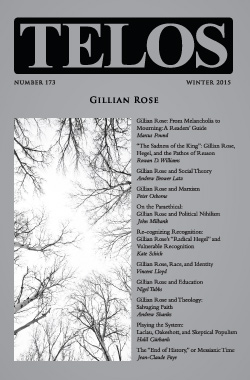 In her preface to the 1995 edition of Hegel Contra Sociology, Gillian Rose says that her project is “to demonstrate a nonfoundational and radical Hegel, which overcomes the opposit[ion] between nihilism and rationalism” and can renew critical thought “in the intellectual difficulty of our time.” However, I think this is not quite the case, for two reasons. First, Rose’s Hegel is not nonfoundational. Instead, as the book makes very clear, Rose’s Hegel does think the absolute, or the true. Yet her Hegel is also radical because she does not eschew the “ineluctable difficulty” of the authority of saying that truth either can or cannot be thought. Second, and in the teeth of this apparent inconsistency, thinking the absolute does not “overcome” such oppositions. Instead, it learns of their truth, their self-determination, by rethinking the religious and political presuppositions upon which these oppositions depend. Against the logic of mastery and ownership, or the propertied logic, that continues to dominate Western thinking, in Rose’s Hegel the learning and education which is endemic to the Aufhebung is not prejudged as “overcoming” (i.e., as abstract truth) or “failing to overcome” (yielding chaos and infinite regression). Instead, what it commends, and what I explore in this article, is a different logic of freedom, an educational logic, which can find its truth in preserving and reforming the opposition between nihilism and rationalism. This self-determining educational logic is the work in which thinking can renew itself in the intellectual difficulty of our time.
In her preface to the 1995 edition of Hegel Contra Sociology, Gillian Rose says that her project is “to demonstrate a nonfoundational and radical Hegel, which overcomes the opposit[ion] between nihilism and rationalism” and can renew critical thought “in the intellectual difficulty of our time.” However, I think this is not quite the case, for two reasons. First, Rose’s Hegel is not nonfoundational. Instead, as the book makes very clear, Rose’s Hegel does think the absolute, or the true. Yet her Hegel is also radical because she does not eschew the “ineluctable difficulty” of the authority of saying that truth either can or cannot be thought. Second, and in the teeth of this apparent inconsistency, thinking the absolute does not “overcome” such oppositions. Instead, it learns of their truth, their self-determination, by rethinking the religious and political presuppositions upon which these oppositions depend. Against the logic of mastery and ownership, or the propertied logic, that continues to dominate Western thinking, in Rose’s Hegel the learning and education which is endemic to the Aufhebung is not prejudged as “overcoming” (i.e., as abstract truth) or “failing to overcome” (yielding chaos and infinite regression). Instead, what it commends, and what I explore in this article, is a different logic of freedom, an educational logic, which can find its truth in preserving and reforming the opposition between nihilism and rationalism. This self-determining educational logic is the work in which thinking can renew itself in the intellectual difficulty of our time.
|
|
||||
|
Telos Press Publishing · PO Box 811 · Candor, NY 13743 · Phone: 212-228-6479 Privacy Policy · Data Protection Copyright © 2025 Telos Press Publishing · All Rights Reserved |
||||


